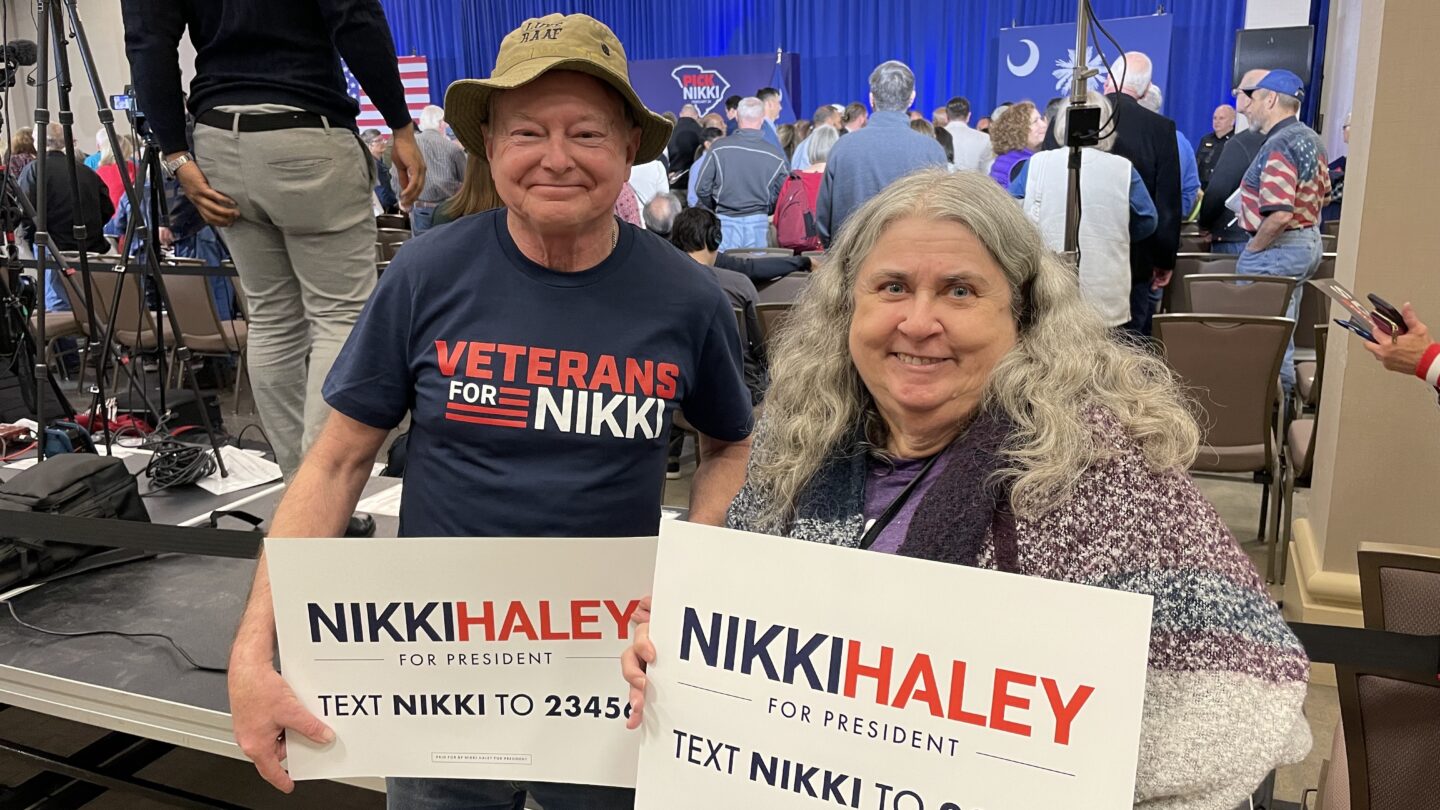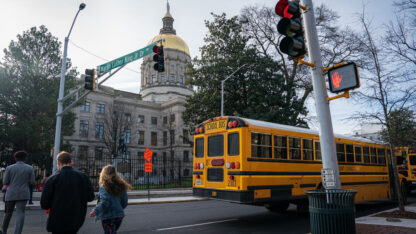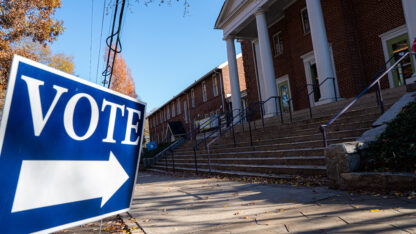BEAUFORT, SC – Just over the Savannah River from Augusta, Georgia, is North Augusta, South Carolina. When Nikki Haley’s campaign bus rolled into town for a stop at the North Augusta town hall, she acknowledged that a chunk of the crowd wouldn’t be able to vote in the state’s “First in the South” Republican primary on Saturday.
“I know Georgia loves to slip over,” Haley told the audience. “We love our sister state, too.”
Haley has signaled she could stay in the race through Georgia’s presidential primary on March 12, but the former South Carolina governor has struggled to overcome former President Donald Trump’s hold on Republicans in her state and nationwide.
With Trump gliding to the GOP nomination, some Georgia voters, politicians and party activists aren’t waiting for their own primary next month to get in on the action. Some are driving east to attend rallies or volunteer. Campaigns ads are bleeding across state lines from South Carolina to Georgia media markets like Savannah and Augusta.
Saturday’s primary could also be instructive for Georgia, illustrating fractures in the Republican party and the distaste many voters have with the two likely major-party nominees this fall.
Among the Georgians in the audience: husband and wife, Roy and Jenny Luke.
Wearing a bucket hat and a “Veterans for Nikki” T-shirt, Roy Luke says he has voted for Trump in the past, but now he’s disgusted by how he talks about veterans. At a recent South Carolina rally, Trump mocked Haley’s husband, who is deployed overseas, and said he would encourage Russia to “do whatever the hell they want” to NATO countries that don’t pay up.
“He was a sitting president and he lost to Joe Biden once, so what makes us think he’s going to win this time around?” Roy Luke says. “So not only is Nikki Haley our best chance, she’s our only chance in November.”
Now, Roy Luke says he’ll vote for Trump if he’s the nominee in November. His wife feels differently.
“I would never, ever vote for Trump, so it would have to be Biden,” Jenny Luke says. “Although I would like it if we had different choices.”
Waiting in life for a selfie with Haley, Georgia voter Jennifer Michael says she cast her ballot for Trump in 2016, but won’t in 2024. She says she wishes Georgia Gov. Brian Kemp, who campaigned with Haley in 2022 and has split with Trump, would lend Haley a hand. Kemp has not endorsed in the primary. Though he’s criticized Trump’s candidacy, Kemp has said he would still vote for him if he’s the nominee.
“I completely understand the stance,” Michael says. “He’s getting really close. He’s wading in a little bit further every day. Hopefully he’ll get there.”
Michael says she is all-in for Haley and will vote for her in March whether she makes it to the Georgia primary or not.
“Her name is already on our ballot, so I can vote for her whether she’s still running or not and that will be what I will do,” Michael says.
But come November, Michael may be forced to choose between Trump and President Joe Biden, and the choice voters like her make will be crucial to how Georgia and the rest of the country swing.
Independent-minded voters like Michael and the Lukes helped shape Georgia’s last two elections. In places like Metro Atlanta, suburban voters helped deliver Biden a victory in 2020 and then re-elected both Kemp and Democratic U.S. Sen. Raphael Warnock in 2022.
But for the majority of Republican primary voters, this election is all about standing by Trump — especially in conservative Upstate South Carolina, where U.S. Rep. Marjorie Taylor Greene of Georgia made a stop Thursday for a meeting of the Greenville County Republican Women’s Club.
At the Point-Set Club, an old building east of downtown Greenville with white columns and neat hedges out front, signs remind visitors that jackets are required after 7 p.m. Greene has been one of Trump’s most vocal defenders.
“President Trump was president for four years,” Greene told the audience. “He’s not going to be a dictator. It’s just not gonna happen.”
She also reminded the crowd that the Republican party has mostly coalesced behind Trump.
“There’s something seriously wrong that Nikki Haley is still running for president,” Greene said to laughs from the audience. “We know she can read, does she not read the polls? We know she can hear, is she not listening to all of you?”
Stacey Shea, a member of the women’s club, says many of the conservative activists who helped elect Haley to the state legislature and then the governor’s office eventually soured on her.
“They thought they were going to be getting a conservative firebrand who’s gonna really help push the agenda and the legislature to the right,” Shea said. “And instead, she immediately cozied up to leadership with her eye on higher office. So she’s got a long history here of making promises and doing the exact opposite when it is politically expedient for her.”
Polling suggests that any home stage advantage for Haley is unlikely to be decisive, as Trump leads her by double digits in the Palmetto State.
Even in the Low Country along South Carolina’s coast, where the sea islands are dotted with beachfront homes and golf communities populated by retirees, many voters here are recent transplants who weren’t around when Haley served at the state capitol.
But at a twilight rally on the waterfront in historic Beaufort, where the streets are lined with antebellum architecture and oaks draped in Spanish moss, Haley told supporters that she is better positioned than Trump to beat Biden this fall. In the last few weeks, she has sharpened her criticism of the former president, after only tepidly criticizing him for most of the primary cycle.
“He’s going to spend more time in court than on the campaign trail,” Haley said. “That’s not how you win an election.”
That could include a court date late this summer in Fulton County, where Trump is facing felony charges for attempting to overturn the 2020 election result. No trial date has been set.
Leaving the rally, St. Helena Island resident Kelly Blake says this region’s history witnessed and shaped many of the pivotal moments in the country’s history. Beaufort is known as the birthplace of Reconstruction after the Union Army occupied the town for the duration of the Civil War.
“I make comparisons all the time with the 1850s and the pre-Civil War era and just how much can we take as a nation before we break?” says Blake, a historian.
Blake says she has been thinking a lot about the fact that whoever wins in November will be in the White House for the country’s semiquincentennial in 2026.
“Who is the person to be at the helm? If it matters who’s at the top, who is going to grab that moment and the potential that it has to bring us together.”
But between Haley and Trump, Blake says she’s still undecided.









